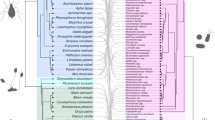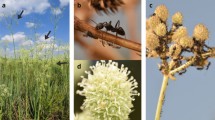Abstract
Reciprocal transplant experiments have been used to estimate the probability that negative frequency-dependent selection by natural enemies has occurred in host populations by determining whether pest populations are less adapted to “foreign” (rare) hosts, which originate from a population with which the pests have not coevolved. However, these experiments usually confound the effects of frequency and origin: the rare genotypes are also genotypes that did not originate at a site. When clonal organisms are used, and the clones occur in more than one population, it is possible to separate the effects of origin and frequency. Here I present the results of an experiment in which Arabis clones of known frequency were reciprocally transplanted among sites. Contrary to expectations, clones at their site of origin had less disease, less herbivory, and higher fitness than foreign clones. However, variation within and among sites in herbivory and infection was large, suggesting that the number of sites and clones needed to thoroughly test the hypothesis of negative frequency-dependent selection in this system is very large: thus, these results are suggestive but not conclusive.
Similar content being viewed by others
Author information
Authors and Affiliations
Additional information
Received: 20 October 1997 / Accepted: 8 February 1998
Rights and permissions
About this article
Cite this article
Roy, B. Differentiating the effects of origin and frequency in reciprocal transplant experiments used to test negative frequency-dependent selection hypotheses. Oecologia 115, 73–83 (1998). https://doi.org/10.1007/s004420050493
Issue Date:
DOI: https://doi.org/10.1007/s004420050493




